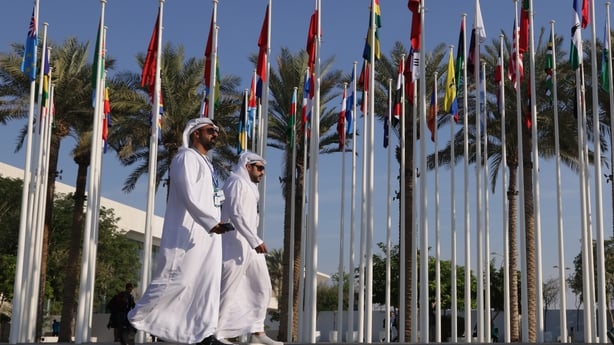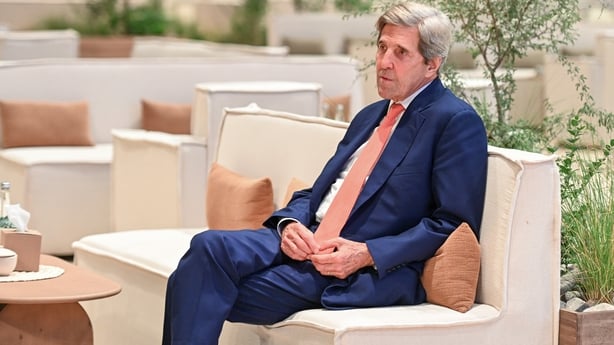The United Arab Emirates has promised to try again to strike a deal at the Dubai climate summit, with at-risk nations and Western powers rejecting a proposal that stopped short of phasing out fossil fuels.
The 13-day COP28 summit has debated a historic first-ever global exit from oil, gas and coal.
But a draft put forward yesterday by COP28 president Sultan Al Jaber, himself head of the UAE oil company, fell well short, instead presenting reductions in fossil fuels as one of several options.
There was total surprise and a lot of disappointment among environmentalists and negotiators from many countries when the draft text of the final COP28 agreement was distributed by the COP28 Presidency yesterday afternoon.
The key section in the agreement about phasing out fossil fuels in line with commitment to limit global warming to 1.5 degrees Celsius had been very significantly watered down.
It said the parties "could" take certain actions to reduce emissions rather than saying that they "will" or "must" take actions.
And reference to fossil fuels was replaced with the term "emissions", which is considered an escape clause to allow oil producers to carry on polluting.
But the biggest shock was that the reference to phasing out fossil fuels was replaced by the term "reducing both consumption and production of fossil fuels" - a far cry from the phasing out that is being demanded by more than half the countries present.
The Emirati hosts put a brave face on the outrage, saying they were working on a new draft and noting that UN rules require consensus from the nearly 200 countries at COP28.
"We need to work on how we put their views into the text in a way that everybody can be happy with," said Majid Al Suwaidi, COP28 director general.
The text, he said, offered "honest, practical, pragmatic conversations about where people's red lines really were".
Saudi Arabia, the world's largest oil exporter, has led opposition to what it sees as a threat to its financial lifeblood.
Seeking to force decisions, the Emiratis had urged a deal before the summit's official close this morning, but Mr Suwaidi said after the deadline that the priority was not to "get the most ambitious outcome possible".
EU climate chief Wopke Hoekstra, who huddled with at-risk nations and UN Secretary-General Antonio Guterres, said he believed a "supermajority" supported strong language on fossil fuels.

The Director General of COP28 climate negotiations in Dubai, UAE Ambassador Majid Al-Suwaidi, has said that the draft climate text published yesterday was designed to spark a reaction.
He said the COP28 Presidency knew that opinions, particularly related to fossil fuels, were polarised and countries have deeply held and deeply split views.
However, what was not known was precisely where country’s "red lines" were. Releasing the draft text he said got the parties to reveal what their "red lines" were.
As a result, he said the COP28 Presidency is now in a position to draft a new text.
Ambassador Majid said the new text being worked on includes all of the elements required for a comprehensive global climate plan to 2030 - including climate mitigation, adaptation, means of implementation and loss and damage.
He said the COP28 Presidency has been seeking the right balance between all these elements.
However, he said the process is up to the negotiating parties.
It is a question of how ambitious the parties truly are, and where they want the balance to be, and that is what the negotiations are about, he said.
The COP28 Director General described COP28 as the most demanding COP agenda of all time and said it would be historic to include language about fossil fuels in the final text.
He highlighted some of the outcomes achieved so far at COP28 including more than $83 billion in new financial commitments.
Some 133 nations have signed up to triple renewable energy capacity and to double energy efficiency by 2030.
Oil and gas companies have agreed actions to reduce methane emissions and other targets.
There have also been declarations covering a range of sectors, from finance to agriculture, and for the first time, health.
Nevertheless many critical issues related to the so-called global-stock-take remain open and have not yet been agreed.
The global-stock-take is the process at the centre of COP28 reviewing what countries have done to deliver the climate commitments signed up in the Paris Climate Agreement of 2015, and what they now need to do to put the world back on course to limit global warming to 1.5 degrees.
Ambassador Majid said the text released yesterday was a starting point for discussions and that the COP28 presidency is calling for the highest possible ambition to deliver an agreement everyone can be proud of.

Revisions expected
Scientists say the planet has already warmed by 1.2C from pre-industrial times and that 2023 - marked by lethal disasters including wildfires across the world - has likely been the warmest in 100,000 years.
The 2015 Paris summit endorsed an ambition of checking warming at 1.5C - a goal endorsed in the latest draft, but which critics say is virtually impossible without serious efforts to curb oil, gas and coal.
"I don't think anybody here wants to be associated with the failure to live up to this responsibility. Not a lot of people in public life are asked to make life and death choices historically," said US climate envoy John Kerry, who helped negotiate the Paris accord.
"This is a war for survival," he said in a closed-door session which ended at around 2.30am.
Mr Kerry has supported calls to phase out fossil fuels, even though the United States remains the world's largest oil producer and much of the rival Republican Party adamantly opposes action on climate.
Former US vice president Al Gore, who won the Nobel Peace Prize for his climate advocacy, said that the "obsequious" draft looked as if it had been written by the OPEC oil cartel.
"In order to prevent COP28 from being the most embarrassing and dismal failure in 28 years of international climate negotiations, the final text must include clear language on phasing out fossil fuels," Mr Gore wrote on X.
Dr Al Jaber acknowledged yesterday there was work to do, and a person familiar with the COP28 presidency's thinking called yesterday's text "an opening gambit" that could be built upon.
The 21-page text does not go so far as to demand action on fossil fuels, only presenting measures that nations "could" take.
"This is not a menu in a restaurant. We have to do all of these things," Canada's Steven Guilbeault, part of a group of ministers tasked by Dr Al Jabber to shepherd negotiations, told AFP.
COP28 a failure if deal cannot be reached
Minister of State Malcolm Noonan said COP28 will be a failure if a deal on phasing out fossil fuels cannot be agreed.
Speaking on RTÉ's Morning Ireland, Mr Noonan said Minister for the Environment and Climate Change Eamon Ryan has been very clear, and the European Union has been very clear, that without specific wording on phasing out fossil fuels, it will be a failure.
"But there's no doubt that the writing is on the wall for fossil fuels. This is what's driving the extreme temperatures that we're seeing, the extreme weather that we're seeing in Ireland at the moment and right across the globe, and it's imperilling present generations and future generations. Therefore, we have to collectively fight to phase this out."
The CEO of Change by Degrees said human beings and their rights and needs have to be put above the value of barrels of oil.
Speaking on the same programme, Dr Tara Shine said she was not surprised by the wording of yesterday's draft COP 28 agreement, but is disappointed that this COP missed "a real opportunity" to show real leadership and a way forward.
"What this text does is it preserves the status quo for the very few that benefit from oil and gas. So those big oil producing countries and the companies that make all the money from selling it to us, and it completely ignores the demands of the people who are whose lives have been devastated by climate change now, and that's not fair. It's not just but it also is not in anybody's best interest."
A lot can happen in the next 12 hours, she said, and this is the time when the EU needs to come together with other progressive states and hold strong in their demands for progressive change.
Additional reporting George Lee


